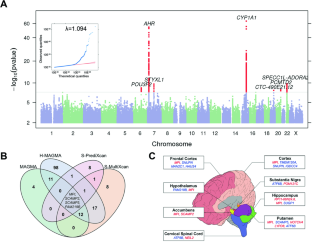2024-06-18 カリフォルニア大学サンディエゴ校(UCSD)
<関連情報>
- https://today.ucsd.edu/story/is-coffee-good-for-you-or-bad-for-you
- https://www.nature.com/articles/s41386-024-01870-x
欧州系血統を持つ英国と米国の参加者を対象としたコーヒー摂取に関するゲノムワイド関連研究により、コホート特有の遺伝的関連が明らかになった Genome-wide association studies of coffee intake in UK/US participants of European ancestry uncover cohort-specific genetic associations
Hayley H. A. Thorpe,Pierre Fontanillas,Benjamin K. Pham,John J. Meredith,Mariela V. Jennings,Natasia S. Courchesne-Krak,Laura Vilar-Ribó,Sevim B. Bianchi,Julian Mutz,23andMe Research Team,Sarah L. Elson,Jibran Y. Khokhar,Abdel Abdellaoui,Lea K. Davis,Abraham A. Palmer & Sandra Sanchez-Roige
Neuropsychopharmacology Published:11 June 2024
DOI:https://doi.org/10.1038/s41386-024-01870-x

Abstract
Coffee is one of the most widely consumed beverages. We performed a genome-wide association study (GWAS) of coffee intake in US-based 23andMe participants (N = 130,153) and identified 7 significant loci, with many replicating in three multi-ancestral cohorts. We examined genetic correlations and performed a phenome-wide association study across hundreds of biomarkers, health, and lifestyle traits, then compared our results to the largest available GWAS of coffee intake from the UK Biobank (UKB; N = 334,659). We observed consistent positive genetic correlations with substance use and obesity in both cohorts. Other genetic correlations were discrepant, including positive genetic correlations between coffee intake and psychiatric illnesses, pain, and gastrointestinal traits in 23andMe that were absent or negative in the UKB, and genetic correlations with cognition that were negative in 23andMe but positive in the UKB. Phenome-wide association study using polygenic scores of coffee intake derived from 23andMe or UKB summary statistics also revealed consistent associations with increased odds of obesity- and red blood cell-related traits, but all other associations were cohort-specific. Our study shows that the genetics of coffee intake associate with substance use and obesity across cohorts, but also that GWAS performed in different populations could capture cultural differences in the relationship between behavior and genetics.


